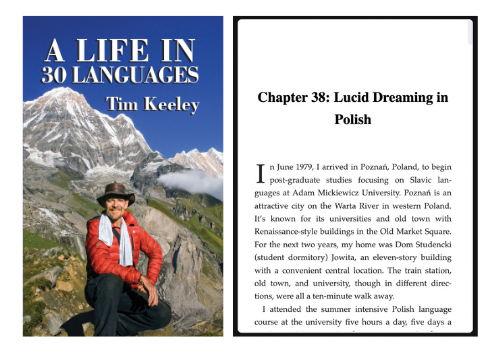Table of Contents
- What is a Lucid Dream?
- How do Lucid Dreams occur?
- What exactly can Lucid Dreams reveal about foreign language FLUENCY?
- Why did I start dreaming in Polish?
- When did I start lucid dreaming?
- How can you increase the possibility to dream in a foreign language?
- What techniques can you use to induce or learn to have lucid dreams?

Image source: Wikipedia
After about one month in Poland, I started dreaming in Polish. I was fascinated that my imaginary Polish native speakers in my dreams spoke naturally in terms of complexity of language, speech habits, prosody, and accent.
So what? They are native speakers!
BUT they were MY NATIVE SPEAKERS … I CREATED THEM IN MY MIND – MY DREAM
- The dialogues were not verbatim repetitions of what I was exposed to during waking hours.
- I could perceive a difference in how their speech compared to mine.
1) What is a Lucid Dream?
Smell, touch, and taste is possible during a lucid dream… sensory perceptions in a lucid dream are even more vivid and intense than in waking life.
- Lucid dreaming involves increased activity in the prefrontal cortex, the part of the brain associated with higher-level thinking and self-awareness.
- There are higher amounts of beta-1 frequency band leading to increased activity in the parietal lobes, making lucid dreaming a CONSCIOUS process.
- An increased frequency in the 40 Hz gamma range in the frontal and frontolateral areas of the brain, the seat of linguistic thought and other higher mental functions associated with self-awareness.
2) How do Lucid Dreams occur?
- Lucid dreaming involves increased activity in the prefrontal cortex, the part of the brain associated with higher-level thinking and self-awareness.
- There are higher amounts of beta-1 frequency band leading to increased activity in the parietal lobes, making lucid dreaming a CONSCIOUS process.
- An increased frequency in the 40 Hz gamma range in the frontal and frontolateral areas of the brain, the seat of linguistic thought and other higher mental functions associated with self-awareness.
3) What exactly can Lucid Dreams reveal about foreign language FLUENCY?
- In the waking state, especially in social interaction in a relatively new language, we significantly limit our performance due to emotions related to our self-identity and self-limiting beliefs.
- In a dream, we create all the participants in our mind, representing a greater degree of FREEDOM of identity creation. We are not limited to the identities usually associated with the self.
- Dreaming allows us to transcend our habitual linguistic identities when interacting in foreign languages.
- In our dreams, our mind can create the native speaker to the extent that it has had comprehensible input from actual native speakers.
- The mind in the dream state can use implicit and explicit knowledge of the grammar to a greater degree and have more active vocabulary than is often possible in the fully conscious state when awake.
- My dreaming self can limit the dream’s storyline so as not to create a sense of falseness in the native speaker’s representation. Nevertheless, my imagined native speaker says things that are more complex than I had previously said in actual interaction in the target language.
- When awake, our SELF-CONCEPT, feelings of lacking authenticity and legitimacy as a native-like competent speaker, and emotions such as anxiety can limit our performance in speaking foreign languages.
4) Why did I start dreaming in Polish?
I had experienced my most intensive language immersion in Poland!
I attended the summer intensive Polish language course at the university five hours a day, five days a week. In addition to class hours, I spent a few hours doing homework. I began studying Polish about nine months earlier at the University of Florida after returning from my first adventure in the Soviet Union. Thus, I could converse in Polish the moment I arrived in Poland.
Every waking hour, I was engaged with Polish in some form or another. I had a Polish roommate and there were endless opportunities to interact with other Polish students. My dorm, Jowita, was more than simply a place to stay—it was a community, a place for gatherings, parties, making friends, and meeting new people. Banal conversations, gossip, debates, and philosophical discussions were the primary source of entertainment.

5) When did I start lucid dreaming?
September 1976, 20 years old, in Montevideo, Uruguay, I became extremely ill. Lying on a soft mattress with the lights dimmed in a cheap hotel room without windows, I had no idea what was ailing me. I was sweating one moment and shivering the next. I could only muster enough physical energy to occasionally take a sip of water or stumble my way to the bathroom.
I was hovering between a dream world and an awareness of my condition and surroundings. At times I felt a deep sense of tranquility, even when the possibility of death entered my consciousness. It was a period of deep reflection on my experiences in life and what the future held for me. It wasn’t an analytical reflection in a fully awake state; instead, it was like watching pieces of a puzzle put themselves together.
I was the spectator watching my brain steadily dismantle the models and concepts we use to interpret the world, leading to moments of experience unconstrained by our usual mental filters. Conclusions drawn were congealed in images and feelings, not something that can easily be put into words.
After this life-changing experience, I often realize I am dreaming and start to control my dream in terms of its direction. I make observations that I clearly remember after awakening. When I arrive at a state between sleep and non-sleep, I often decide to go back to the dream to explore the dream theme more in-depth. That is what I did in Poland.
6) How can you increase the possibility to dream in a foreign language?
Immersion: Immerse yourself in the language as much as possible during the day. This can help your brain to stay focused on the language even while you’re asleep.
Language Practice Before Bed: Spend some time practicing the language before bed, whether it’s reading a book, listening to a podcast or watching a show. This can help your brain continue to process the language even when you are asleep.
Visualization: Before going to bed, visualize yourself in a dream where you are speaking and using the foreign language. This can help to prime your brain to dream in the foreign language.
Repetition: Before going to bed, repeat vocabulary or phrases in the foreign language that you want to dream about. This can help to reinforce the language in your mind while you’re asleep.
Audio cues: Play audio recordings of the foreign language while you sleep. You can use a language learning app or find audio clips online. The sound of the language can help to stimulate your brain to dream in that language.
7) What techniques can you use to induce or learn to have lucid dreams?
WILD Technique: Wake up after 5-6 hours of sleep and stay up for 30 minutes. Then, go back to bed and focus on staying conscious as you fall asleep. This can help you enter a dream state while still being aware.
MILD (mnemonic induction of lucid dreams): which also involves waking up after five hours of sleep and then developing the intention to remember that you are dreaming before returning to sleep, by repeating the phrase: “The next time I’m dreaming, I will remember that I’m dreaming.”
Practice good sleep hygiene: Develop a regular sleep schedule. Avoid caffeine and alcohol in the evening. Avoid screens at least thirty minutes before bed. Such habits can promote REM sleep, an important step for lucid dreaming.
Keep a Dream Journal: Write down your dreams every morning, including any details you remember. This can help you notice patterns in your dreams and become more aware of when you are dreaming.
Practice Mindfulness: Being more present and aware during your waking hours can help carry over into your dream state, making it easier to become lucid.


